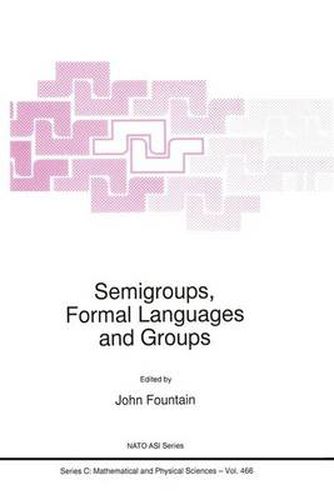Readings Newsletter
Become a Readings Member to make your shopping experience even easier.
Sign in or sign up for free!
You’re not far away from qualifying for FREE standard shipping within Australia
You’ve qualified for FREE standard shipping within Australia
The cart is loading…






This title is printed to order. This book may have been self-published. If so, we cannot guarantee the quality of the content. In the main most books will have gone through the editing process however some may not. We therefore suggest that you be aware of this before ordering this book. If in doubt check either the author or publisher’s details as we are unable to accept any returns unless they are faulty. Please contact us if you have any questions.
This volume presents the core of invited expository lectures given at the 1993 NATO ASI held at the University of York. The subject matter of the ASI was the interplay between automata, semigroups, formal languages and groups. The invited talks were of an introductory nature but at a high level and many reached the cutting edge of research in the area. The lectures were given to a mixed group of students and specialists and were designed to be accessible to a broad audience. The papers were written in a similar spirit in the hope that their readership will be as wide as possible. With one exception they are all based on the talks which the lecturers gave at the meeting. The exception is caused by the fact that due to unanticipated progress the topic of John Rhodes’ talk is now in such a state of flux that it has not been possible to produce a paper giving a clear picture of the situation. However, we do include an article by a member of the Rhodes school , namely Christopher Nehaniv, expanding on a contributed talk he gave. It generalizes the celebrated Krohn-Rhodes theorem for finite semigroups to all semigroups. For many years there has been a strong link between formal language theory and the theory of semigroups. Each subject continues to influence the other.
$9.00 standard shipping within Australia
FREE standard shipping within Australia for orders over $100.00
Express & International shipping calculated at checkout
Stock availability can be subject to change without notice. We recommend calling the shop or contacting our online team to check availability of low stock items. Please see our Shopping Online page for more details.
This title is printed to order. This book may have been self-published. If so, we cannot guarantee the quality of the content. In the main most books will have gone through the editing process however some may not. We therefore suggest that you be aware of this before ordering this book. If in doubt check either the author or publisher’s details as we are unable to accept any returns unless they are faulty. Please contact us if you have any questions.
This volume presents the core of invited expository lectures given at the 1993 NATO ASI held at the University of York. The subject matter of the ASI was the interplay between automata, semigroups, formal languages and groups. The invited talks were of an introductory nature but at a high level and many reached the cutting edge of research in the area. The lectures were given to a mixed group of students and specialists and were designed to be accessible to a broad audience. The papers were written in a similar spirit in the hope that their readership will be as wide as possible. With one exception they are all based on the talks which the lecturers gave at the meeting. The exception is caused by the fact that due to unanticipated progress the topic of John Rhodes’ talk is now in such a state of flux that it has not been possible to produce a paper giving a clear picture of the situation. However, we do include an article by a member of the Rhodes school , namely Christopher Nehaniv, expanding on a contributed talk he gave. It generalizes the celebrated Krohn-Rhodes theorem for finite semigroups to all semigroups. For many years there has been a strong link between formal language theory and the theory of semigroups. Each subject continues to influence the other.